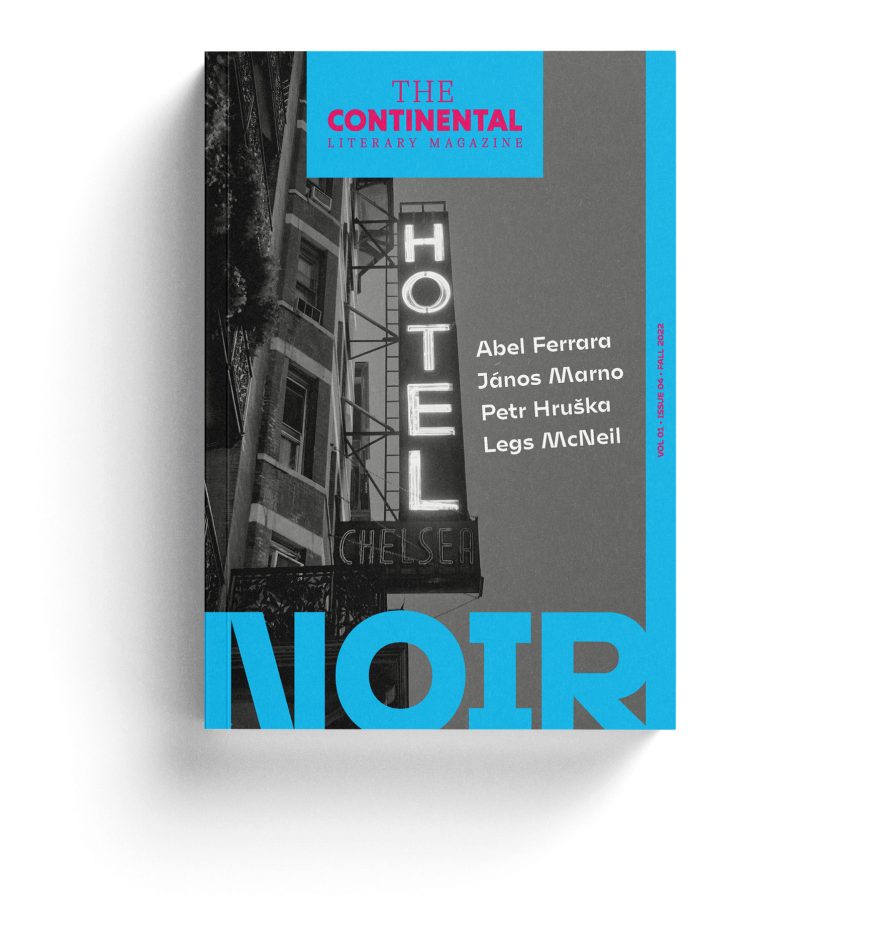
27th April 2023
Fiction
8 minutes read
Blackboard
translated by Richard Coombes

27th April 2023
8 minutes read
The ice cubes had almost dissolved, and the dark amber liquid in the glass was almost transparent. The sun would soon disappear over the horizon, but it was still light enough for the bulky, middle-aged man sitting at the café table to see the slender young woman in the light blue dress running along a stretch of surf. Her chestnut hair fluttered, from running perhaps, or perhaps in the evening breeze. She looked back over her shoulder and smiled, an invitation. The nameless man shook his head, and she ran on.
The waves, he saw, were erasing her narrow tracks.
The man recalled his schoolteacher, Ivan Hoofin (the schoolkids called him The Hoof, naturally). He would often say that history was an attempt to make sense of tracks left on the shore by the past and washed away by the surf. Thin, wiry, and grey-haired, he’d seemed like an old man to the kids, though he was most likely younger than the man was now. He was probably lonely and unhappy; that would explain his love of hopeless metaphors.
One time he was recounting the terrible famine of 1933. It was possible to talk about it by then, although The Hoof didn’t use the term ‘Holodomor’, perhaps because he knew about it from the stories of survivors, not from books.
It was a rainy autumn day. Through the window, painted metal roofs and the low, grey sky were visible.
The Hoof wrote a list of numbers on the blackboard: how many had died of hunger, how many had been killed in the war, how many had vanished in Stalin’s camps.
Perestroika was in full swing. Grown-ups were spluttering at the chance to say out loud things that only lately had been banned; there was something indecent in their delight. The Hoof was his usual brooding self. Taking a step back, he looked at the blackboard and said, ‘What you see here are numbers. But think about it for a moment. All these numbers were actually people. People of all sorts. Men, women, children. Schoolchildren like you. All gone … gone, as if wiped away with a cloth.’
After that, he switched from metaphor to reality and wiped the numbers off the board. No one had made any attempt to memorise them. Perestroika was in full swing and bringing teenagers wholly other kinds of forbidden pleasure. The cooperatives set up a video theatre at the local Palace of Culture, and there the youngsters could watch French comedies and American gangster movies for a ruble. They knew very little history, and for them the bootleggers of the Prohibition, the Italian mafiosi of the fifties and veterans of the Vietnam War all existed at the same time. Many of them were convinced that everything being shown on the Soviet Ruby TV screen was happening right now the other side of the rusty iron curtain.
As a boy, he’d lived with his mother, just the two of them. Money was tight, and the man’s memory of most of the films had come through re-tellings by Sergey Mironenko, whose father was friendly at work with the director of the House of Culture, and Sergey was allowed in free.
If someone had told the boy then that some thirty-five years later he’d be able to watch practically any film in the comfort of his own home, he wouldn’t have believed it―any more than he’d have believed that he’d one day be having sex in a five-star hotel suite with a girl with sparrow bones, chestnut hair, small breasts, and grey eyes that had him swooning. He’d never asked her how old she was, but he had a suspicion she’d not been born at the time he was scraping together the money for a ticket to the video theatre.
The boy made up for not being able to see films by reading books borrowed from the selfsame Sergey or Misha Smolyanovsky. These were the first publications put out by the cooperative (meaning private) publishers. Their covers tended towards the lurid and bloodstained. The boy was reading one such book in The Hoof’s class, a collection of hurriedly translated hard-boiled detective stories that had everything he loved about the films: brutal men, beautiful, wily young women, murders, alcohol, and sex.
Looking at the grey sky beyond the classroom window, the boy conjured up a rainy San Francisco and the neon lights of bars, brothels, and casinos.
The Continental Op, a thickset man with no name and a face of flint, wrapped in a cape and with a hat pulled down over his eyes, was making his way through streets full of violence and debauchery.
The boy’s notions of debauchery were vague. Schoolchildren were not allowed to see pornographic films, erotic magazines did not get as far as his little town, and the boys were afraid even to think about seeing a real live woman’s bare breasts. This made the most commonplace things seem debauched to them. It was one such instance that had fixed that lesson in his memory.
The boy was just reading about yet another femme fatale seducing her victim when Dima Ivanchuk poked him in the back. The boy was ready to thump him, as any hard-boiled detective would obviously do, but when he turned round, he saw Ivanchuk with his finger to his lips, nodding with an idiotic smile in the direction of the next row. Following his gaze, the boy froze, as if blinded by a flash of bright light.
Across the aisle sat Galya Kuzmina, the class Komsomol Organiser, a top student and a girl known for her tidiness. Her brown school skirt had ridden up, most likely as she sat down, and there, presenting themselves to the boy’s eyes, were about fifteen centimetres of teenage thigh, pale and already a little rounded. Of course, the gym shorts all the boys and girls wore for PE revealed far more, but this chance exposure, unexpected and unintentioned, turned the teenagers into peccant Peeping Toms, excited and embarrassed by the forbidden spectacle. Unable to look away, the boy gave Misha Smolyanovsky, sitting beside him at the same desk, a poke in the side. Pasha Skorokhodko, in front of them, turned of his own accord, as if sensing something.
Pasha was a head taller than his classmates and seemed older than his years. He aroused a certain amount of fear out on the street, but the boy knew that you wouldn’t find a more kind-hearted and ingenuous lad. More than anything else, Pasha loved stuffing himself with food, a love, moreover, of such scope that he could spend a good quarter of an hour recounting what he’d eaten the day before. Interrupting his narrative flow was well-nigh impossible. One time, Ivanchuk threatened that if Pasha did not shut up, he would shove Pasha’s own hat into his mouth, to which Skorokhodko replied in genuine indignation and to general delight: how on earth would I eat then?
Glimpsing a stretch of Galya’s naked thigh, Pasha let out a loud gasp, and The Hoof broke off his contemplation of the board to offer the class a stern stare. The boys tried to look as innocent as possible, but the teacher’s gaze rapidly reached Kuzmina, and The Hoof himself froze, as if what he was seeing had shaken him as much as it had them.
For years, the man had put The Hoof’s confusion down to uncertainty over what to do―like, How do I restore order in the classroom without shaming the girl? Now, the thought occurred to him that an erotic haze had descended on the teacher as well. After all, there was about the same age difference between Ivan Mikhailovich and Galya Kuzmina as between the man and the long-legged, grey-eyed Galya―by chance the namesake of his classmate―who was just then returning from her jog along the seashore.
Alas, time blunts desire and douses the fires of lust. However head-spinningly beautiful the man’s young lover might have been, even his first encounter with her nakedness had not made as strong an impression as that long ago flicker of teenage thigh. The Hoof, too, by his age had probably managed to experience enough naked women; in any case, his confusion lasted no more than a second.
‘Kuzmina,’ he said, ‘come out here and write your homework on the board.’







